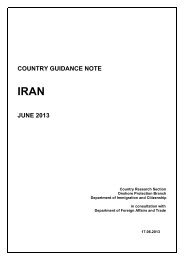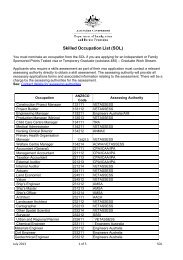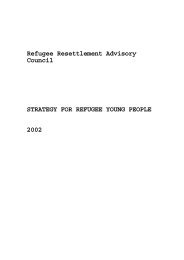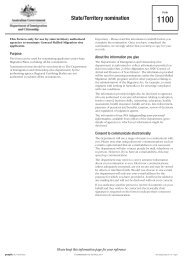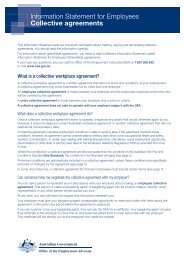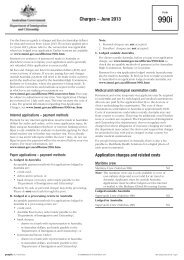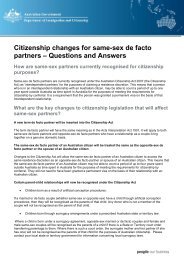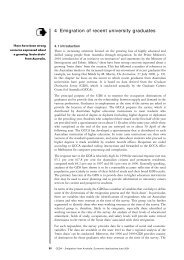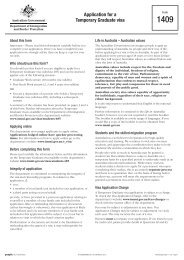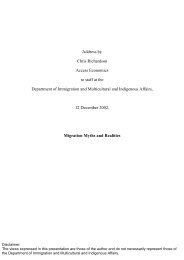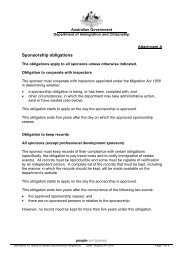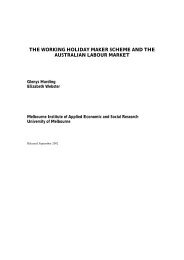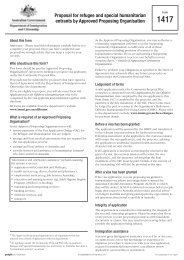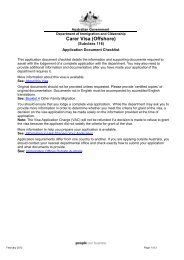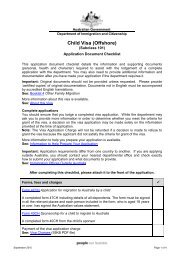Evaluation of the Integrated Humanitarian Settlement Strategy (IHSS)
Evaluation of the Integrated Humanitarian Settlement Strategy (IHSS)
Evaluation of the Integrated Humanitarian Settlement Strategy (IHSS)
Create successful ePaper yourself
Turn your PDF publications into a flip-book with our unique Google optimized e-Paper software.
A1.6.1 Clients<br />
Clients <strong>of</strong> Services for Survivors <strong>of</strong> Torture and Trauma<br />
Small focus groups <strong>of</strong> approximately six clients were arranged to explore client satisfaction with <strong>IHSS</strong><br />
and services for survivors <strong>of</strong> torture and trauma. All clients who attended were <strong>of</strong>fered financial<br />
compensation for <strong>the</strong>ir time and costs incurred. This was not referred to as ‘payment’ so as not to<br />
complicate <strong>the</strong> client’s experience <strong>of</strong> <strong>the</strong> group.<br />
Clients <strong>of</strong> <strong>the</strong> <strong>Integrated</strong> <strong>Humanitarian</strong> <strong>Settlement</strong> <strong>Strategy</strong>.<br />
<strong>IHSS</strong> clients to be interviewed were arranged independently <strong>of</strong> <strong>IHSS</strong> services through <strong>the</strong> Adult<br />
Migrant Education Program (AMEP). AMEP contacts were provided to Urbis Keys Young by DIMIA<br />
from <strong>the</strong> AMEP National Directory.<br />
Urbis Keys Young established contact with each area’s AMEP representative by phone or e-mail. The<br />
AMEP representatives were asked to find clients who met <strong>the</strong> following criteria:<br />
<br />
<br />
<br />
<br />
had been in <strong>the</strong> country for a period <strong>of</strong> between six and twelve months (so <strong>the</strong>y had passed <strong>the</strong><br />
initial stage <strong>of</strong> settlement, and were looking back on <strong>the</strong>ir experience); and<br />
had arrived under <strong>the</strong> following visa categories - Refugee (sub class 200, 201, 203, 204), Special<br />
<strong>Humanitarian</strong> Program (sub class 202) and Temporary Protection visas (sub class PV or TPV);<br />
and<br />
had ei<strong>the</strong>r used or are currently using one or more <strong>of</strong> <strong>the</strong> <strong>IHSS</strong> services (namely accommodation<br />
support, household formation support, initial information and orientation assistance, early health<br />
assessment and intervention, community support for refugees and proposer support); or<br />
had not accessed <strong>IHSS</strong> services.<br />
Participants were to meet additional country <strong>of</strong> origin and demographic criteria, as follows.<br />
State Country <strong>of</strong> Origin O<strong>the</strong>r specifications<br />
NSW<br />
VIC<br />
TAS<br />
NT<br />
Iraq<br />
Ethiopia and / or Somalia<br />
mixed<br />
Horn <strong>of</strong> Africa countries<br />
QLD / Brisbane Sudan women<br />
QLD / Cairns mixed young people<br />
QLD / Toowoomba mixed men<br />
SA<br />
WA<br />
Former Yugoslavia<br />
Bosnia Herzegovina<br />
A3<br />
<strong>Evaluation</strong> <strong>of</strong> <strong>the</strong> <strong>Integrated</strong> <strong>Humanitarian</strong> <strong>Settlement</strong> <strong>Strategy</strong> 27 May 2003



